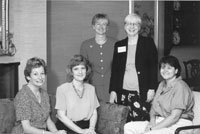
"Nurses
are in Congress.
They are health officers.
They run foundations
and companies.
They are entrepreneurs.
The common denominator
is that nursing
leadership is aimed
at enhancing the health
of others through
whatever mechanism
is available within
moral and ethical bounds.
The sky's the limit."
--Dean Marla
Salmon
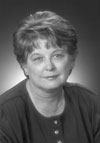
"I
can't stress enough
the importance
of maintaining
professional affiliations."
—Martha Orr, 64N, 65MN, executive director, New York
State Nurses Association
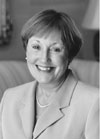
"Those
in leadership
positions are only
as good as the people
who work for them.
It's important to
remember that,
as part of a
policy-making team,
your supervisor is
relying on you
to assist them in
making important decisions
that may severely impact organizations,
programs,
and people."
—Mary Lou Keener, 72MN, deputy assistant secretary
of the Air Force
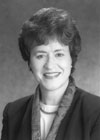
"I
don't want
crystal paperweights,
I want money
for students."
—Dr. Sue Hegyvary, 66MN, when she stepped down as
dean of the University of Washington School of Nursing
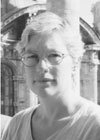
"You
need to be honest
about your level
of knowledge,
possess some
self-confidence, and
have a love of adventure
or challenge. If you can
muster all three
at the same time,
you will succeed
with a little hard work
and determination."
—Quinn McLean, 92MN/MPH, director, School of Health
Sciences at Koc University in Turkey
By Pam Auchmutey and Gretchen Decker
On May 19, Martha Orr, 64N, 65MN, breathed a huge sigh of relief. The 400 nurses at Nyack Hospital had agreed to a five-year contract, ending a grueling 151-day strike. "Thankfully, the issues were finally resolved," says Orr, executive director of the New York State Nurses Association (NYSNA), the nation's oldest and largest state professional nursing organization. Despite weeks of contract negotiations, any trace of weariness quickly disappears from Orr's voice in describing her role for the past 15 years."The opportunity to lead nurses is the greatest career I could wish for," she says.
Alumni like Orr illuminate the Nell Hodgson Woodruff School of Nursing's strong tradition of educating nurses who excel nationally and internationally in a variety of leadership roles. After Orr completed her MN in medical-surgical nursing at Emory in 1965, she broke new ground in her field as the first clinical nurse specialist at Emory University Hospital. At that time, none of the nurses or physicians had ever worked with a nurse clinician, and there was no peer group to cheer her on.
"I spent some time crying in the linen closet that first year," says Orr. Still, she toughed it out in surgical oncology and later switched to nephrology at Grady Memorial Hospital and at hospitals in Virginia, Denmark, and New York. She had been with The New York Hospital for 11 years when she decided a change was in order. Her clinical experience and participation in the NYSNA were strong playing cards in her appointment as the group's executive director.
"I can't stress enough the importance of maintaining professional affiliations," she says.
As the top administrative officer for the NYSNA, Orr oversees 130 staff members at three locations and serves as chief spokesperson. "A good part of my profession is interpreting the nursing profession to the public," explains Orr. In doing so, she helps the NYSNA maintain high nursing and health care standards through lobbying and policy-making, counseling nurses on all aspects of practice, offering continuing education, and negotiating contracts on behalf of some 34,000 nurses.
Orr is quick to point out that the Nyack strike is symptomatic of larger issues facing nurses nationwide. "The real problem is how much the health care system values or doesn't value registered nurses in the delivery of care. Health care has become a product line subject to economics."
To overcome these obstacles, nurses must convince hospitals and the public that they are crucial to hospitals' existence. For example, the NYSNA mounted a $2.5 million public relations campaign to educate consumers on the role of nurses in health care. When talking with nursing students, Orr encourages them to give their business cards to patients. "That way, patients know exactly who is responsible for their care and how to get in touch with them."
Being a good nurse also means going out on a limb from time to time. "I've always been a risk-taker and a maverick," Orr says. "I probably got my gumption from my mother."
The power of networking
Mary Lou Keener, JD, 72MN, RN, believes in luck. "People often ask me how I was able to land some of the jobs I've had," says Keener. "It's absolutely necessary to have outstanding credentials and experience, but after that it's 99% luck."
In 1993, Keener was nominated by President Clinton and confirmed by the US Senate as the general counsel of the Department of Veterans Affairs (VA). After nearly five years, she left the VA for her current Pentagon assignment as deputy assistant secretary of the Air Force for force management and personnel.
Her career in health care and law began taking shape in the mid-1960s, when Keener served as a US Navy nurse at the Philadelphia Naval Hospital and aboard the USS Repose, a hospital ship in Vietnam. She then worked on the staff of Congressman Donald Riegle in Washington, DC, before attending graduate school in Atlanta. After graduating with an MN from Emory, she taught nursing at Georgia State University and was an active member of the Georgia Nurses Association (GNA). She later became its executive director.
"My background on the Hill in Washington pulled me into the GNA when I got to Atlanta," says Keener. "When I started teaching at Georgia State, I was appointed to the GNA legislative committee and eventually was elected president of the GNA 5th District."
In the meantime, Keener had enlisted in the US Air Force Reserve and served as a flight nurse at bases in Georgia and Washington. In 1991, during the Gulf War with Iraq, she was called to active duty as a primary care consultant at Eglin Air Force Base in Florida. By then, Keener had earned a law degree and practiced for several years in Atlanta before opening her own firm specializing in medical malpractice and health-related claims.
It was after Clinton's nomination in 1992 that Keener was invited to submit her resume for VA general counsel. The decision wasn't easy. Keener had lived in Atlanta for more than 20 years and had spent five of them building her law practice. She decided to go for it. Before long, the Senate confirmed her presidential appointment, making Keener responsible for 700 staff members, a $46 million annual budget, and a host of legal issues. During her tenure there, Keener and her staff also provided counsel to the Veterans Health Administration (VHA) regarding the transition of the VA health care system to managed care.
"In 1993, the VA had 123 hospitals loaded down with specialists and few primary care providers," says Keener. "By 1998, several hospitals had closed, the number and length of inpatient stays had decreased, and hundreds of outpatient clinics had opened. We were instrumental in assisting the VHA in making the statutory and regulatory changes required to get the system in shape."
Keener moved in 1998 to her current post, where she oversees policies and programs for Air Force military and civilian personnel and has traveled to hot spots in Europe, Albania, and Romania to review peacekeeping operations. She is also assisting the Air Force's transition to Tricare, the national HMO administered by the Department of Defense. The change has required numerous policy decisions concerning the integration of Army, Navy, and Air Force health care benefits.
As Keener emphasizes, "Those in leadership positions are only as good as the people who work for them. It's important to remember that, as part of a policy-making team, your supervisor is relying on you to assist them in making important decisions that may severely impact organizations, programs, and people. Sometimes that means telling them things they don't want to hear."
Keener believes she made it to the Pentagon by viewing each experience as a stepping stone to the next and by valuing the professional relationships she formed and kept along the way.
"Each position expands your knowledge and helps you move on to the next," she says. "Emory prepared me for a great job at Georgia State. I attended one of the best nursing schools in the country on the GI Bill, and I'm very grateful for the experience. It also brought me to Atlanta, which became my home for 23 years and where I became very entrenched in the community."
Building successful partnerships
Sue Hegyvary, PhD, 66MN, RN, FAAN, has never shied away from opening doors. As a graduate student at Emory in the 1960s, she experienced a nursing school with a world vision. "The nursing faculty told me that doors would open if I just tried to open them," says Hegyvary, professor and dean emerita of the University of Washington (UW) School of Nursing in Seattle. "They also emphasized the fact that education is unlimited."
The advice took, and Hegyvary eventually earned her PhD and served 14 years as associate vice president and associate dean at Rush University School of Nursing in Chicago before taking the reins of UW's nursing school. As dean, Hegyvary ensured that UW maintained its top-notch reputation and took the school to new heights by building strong clinical ties with the community. In 1990, Hegyvary forged a partnership between UW and ERA Care, Inc. to provide nursing care for retired senior citizens. To complete its end of the bargain, the nursing school designed and implemented health care standards and policies for a new housing facility. It now oversees health care practices for six ERA Care facilities in Seattle.
The partnership made for strange bedfellows at first. "It took the faculty three months to discuss, hammer out details, and vote on an agreement to proceed with a 10-year renewable contract with ERA Care," Hegyvary explains. "I considered this record time for an academic institution, but our corporate colleagues wondered why we were taking so long. They came to us because of our reputation for excellence—they wanted us as partners. But they expected us to function like business people, with the same speed."
As the partnership took shape, Hegyvary and her colleagues learned to match their pace with the hard realities of corporate decision-making. But the benefits of this union have outweighed any drawbacks. It has enhanced the geriatric curriculum for undergraduate and graduate students, provided technical access to different facilities, and created opportunities for clinical practice and distance learning. ERA Care also funded a new professorship for the nursing school, and faculty members can tap a rich pool of research ideas and clinical colleagues to collaborate on new projects.
Another accomplishment close to her heart is the Hegyvary Citizens of the World Fund, which awards funds to UW undergraduate and graduate students for clinical experience overseas. Students have worked at sites on every continent and through the nursing school's exchange programs with Thailand and Taiwan. When she stepped down as dean, Hegyvary told colleagues, "I don't want crystal paperweights, I want money for students." The fund has since grown into an endowment.
Hegyvary maintains her worldly interests as editor of the Journal of Nursing Scholarship, published by Sigma Theta Tau International for 120,000 members in 90 countries. She also teaches an interdisciplinary course on international health and a graduate course on care systems management at UW. And although her career has focused on international scholarship and teaching, she has never left the patient bedside far behind. "When you consider the responsibility of designing and monitoring a health care facility for ERA Care, there is no separation between what some people call 'real' nurses and academics," she says. "Nursing as a whole deals with people's health and illness, anywhere in the world."
Guiding nursing's future overseas
Quinn McClean, 92MN/MPH, RN, was spending a quiet evening at home with her family when she got a phone call that would change their lives. The caller was the provost of Koc University in Turkey, whom McClean had treated one summer in the emergency room at Martha's Vineyard. He had called McClean to see if she might be interested in directing the university's new School of Health Sciences and its nursing program.
"I didn't know what to say," says McClean, who had lived in Turkey as a child. "We were very happy in Boston. But the more I thought about it, the more I realized that life places these opportunities at your feet, and if you don't pick them up and run with them, you miss out on a lot."
Today, McClean occupies an office in Istanbul that overlooks the construction site of a new state-of-the-art building that will house Koc University's nursing program and a new education and research center that will provide continuing education for nurses and some physicians. Once the building opens, McClean expects the entering class to increase gradually from 20 to 50 students, with a total enrollment of 200 for four years. The program will help shape nursing's future in Turkey, which has just recently required that all nurses be trained at the baccalaureate level, beyond the traditional high school or two-year degree level.
Clinical nursing has far to go. Turkish nurses generally grow up in poor communities and often lack the proper education to compete in the modern health care setting. Although Turkey has a few BSN and graduate nursing programs, the nurses who graduate from them have little clinical experience and often pursue doctorates so they can teach. "The result is poor-quality clinical education," McClean says. Nurses who work in hospitals typically do not interact with the physician or patient regarding diagnosis and treatment. "Until very recently at our own hospital, nurses didn't even have their own stethoscope but used the common one for the floor," she adds.
McClean is working to change that. This fall, the second class of 20 freshmen will enter the nursing program on full scholarship. Those who graduate are guaranteed a job for four years at American Hospital, Turkey's oldest and most modern facility. The nursing program is also recruiting male students, breaking the barriers that have excluded men from nursing practice.
How did an Emory-trained nurse like McClean come to direct a nursing program in such an exotic setting? "I have a long history with Turkey and have proven myself working in developing countries," she says.
Two years after graduating from Emory with a dual master's degree in nursing and public health, McClean joined Medecins Sans Frontieres (MSF or Doctors Without Borders) and landed in Thailand as a field epidemiologist for some 120,000 refugees from Burma. She also directed malaria studies and worked with Epicentre (Europe's CDC) to design a tuberculosis surveillance system to use in a TB hospital.
McClean later took another MSF assignment in Azerbaijan, where she trained physicians and health aides on World Health Organization guidelines for diarrheal and respiratory illnesses and taught training skills and methods to MSF staff from the Caucasus region. After the medical coordinator for the region resigned, McClean assumed the role of managing three field offices and 250 employees. When the project's focus shifted to primary care, McClean juggled hats as proposal writer, project designer, and negotiator with international organizations and the local Ministry of Health. Before she knew it, McClean had evolved into an international health expert.
"I didn't do it consciously," she explains. "I am just someone who is interested, hard working, and wants to change people's lives for the better through my actions."
"Emory definitely laid the groundwork and gave me the courage to try new things," she adds. "You need to be honest about your level of knowledge, possess some self-confidence, and have a love of adventure or challenge. If you can muster all three at the same time, you will succeed with a little hard work and determination."
The sky's the limit
The School of Nursing has implemented new programs to ensure that nurse leaders like McClean continue to succeed in any number of roles. Since becoming dean last year, Marla Salmon, ScD, RN, FAAN, has worked with faculty like Joyce Murray, EdD, RN, FAAN, to identify areas of growth that are critical to the nursing school's future. Educating more nurse leaders was a prime target.
"Nursing schools most recently have focused on preparing nurse practitioners with excellent clinical skills to practice in primary and specialty care areas," says Murray. "Changes in the health care system have created the need for nurses to have additional leadership skills to function more effectively in a variety of settings. Nursing education is shifting to provide these leadership programs."
"Under the old health care system, nurses learned to work with the physician as team leader," adds Professor Lynda Nauright, EdD, RN. "But the system has changed dramatically, and now nurses are required to lead interdisciplinary teams of health care specialists. The emphasis has also shifted from hospital-based care to prevention and health promotion."
Another factor is that more nurses hold leadership positions outside the traditional realm of nursing. Salmon ticks off the list: "Nurses are in Congress. They are health officers. They run foundations and companies. They are entrepreneurs. The common denominator is that nursing leadership is aimed at enhancing the health of others through whatever mechanism is available within moral and ethical bounds. The sky's the limit."
Emory's nursing school is meeting the revolution head on with two new master's programs. Both one-year programs will shape nurses' leadership abilities, but in different areas. Nurses from all specialties may apply for the Leadership in Health Care Program, whose courses will focus on self-development, organizational leadership, and community building as well as human resource development, financial management, and technology. Students will also complete a residency by working with a leadership mentor in a health institution or other setting.
One of the first courses—Professional and Personal Development as a Leader—will help students tap their strengths from within. "To be an effective leader, you have to develop your own skills and self-worth so you can help other people develop theirs," explains Nauright. "That's how an organization sustains itself and grows."
Nauright and others used the same philosophy to plan the second master's program, Leadership in Public Health Nursing. Initiated by Salmon and funded with a federal grant from the Division of Nursing in the Department of Health and Human Services, this program addresses the results of a School of Nursing survey that showed an overwhelming need for skills and leadership education amid the growing demand for community services.
Emory's new MSN program is open to public health nurses, school nurses, occupational health nurses, and other BSN graduates who desire to work in public health. The students enrolled this fall will study three core areas—leadership, nursing, and public health—and will work with mentors in public health departments and in the community to gain more in-depth clinical experience. To make the program more accessible, nursing courses will be taught partially on Saturdays and partially online. Faculty in the Rollins School of Public Health will teach some courses online after three days of face-to-face orientation and instruction.
According to coordinator Brighid Kelly, PhD, RN, graduates of this program will qualify as leaders in public health nursing with an impressive set of skills. "They will be able to articulate issues and policies to diverse populations, negotiate outcomes, influence legislators and communities, write grant proposals and reports, and promote interdisciplinary collaboration," says Kelly. "As practitioners, they will use epidemiological and biostatistical theories to analyze demographic trends and environmental factors to identify populations at risk. They will mobilize community partners to identify, plan, and implement health policies and programs. And they will be able to evaluate health care services and personnel to ensure that vulnerable populations have access to effective and efficient services."

"Graduates
of our
master's program
will be leaders in
public health nursing.
They will be able
to articulate issues and
policies to diverse
populations, negotiate
outcomes, influence
legislators
and communities,
write grant proposals
and reports, and promote
interdisciplinary collaboration."
—Dr. Brighid Kelly, coordinator, Leadership in Public
Health Nursing
